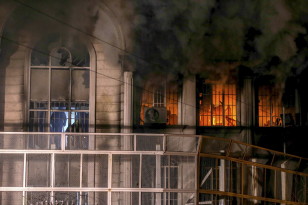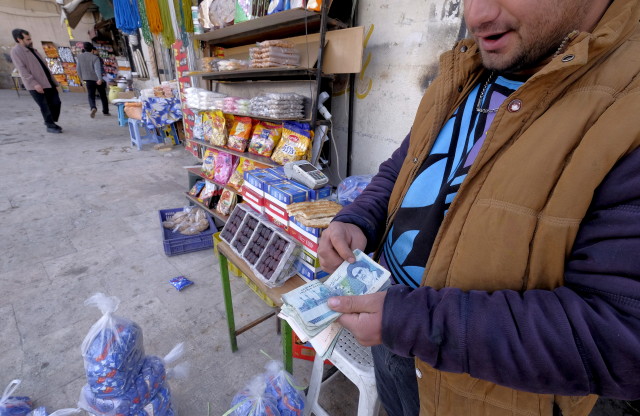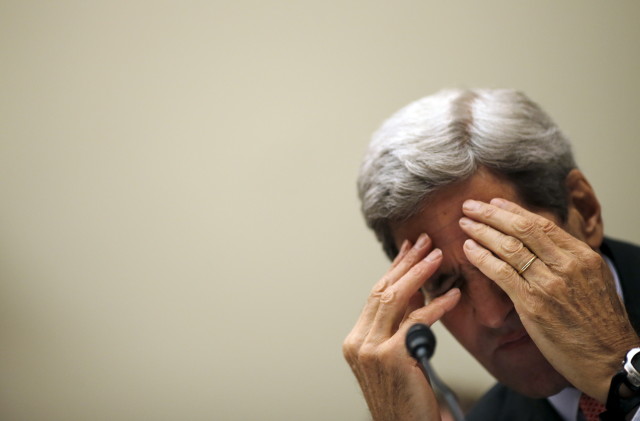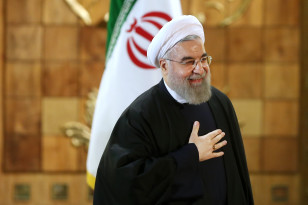One of the many ripple effects of the U.S.-Iran prisoner swap and Tehran’s verified compliance with the historic nuclear accord is a new world order in the Middle East.

Flames and smoke rise from Saudi Arabia’s embassy during a demonstration in Tehran on Jan. 2, 2016. (Reuters)
Saudi Arabia – a long-time rival of Tehan – is nervous and talking tough, as the lifting of costly Western sanctions is set to propel Iran’s economic might.
Not long before the latest developments, Saudi Arabia had already stoked tensions by beheading the prominent Shia cleric Sheik Nimr al-Nimr. That provoked a violent attack on the Saudi mission in Iran, which in turn, gave the House of Saud a reason to sever diplomatic ties.
Meanwhile, both President Barack Obama and Secretary of State John Kerry hailed the use of diplomacy to win the release of five Americans in a prisoner swap with Iran, simultaneously praising Iran’s paused nuclear program.
Where does that leave the traditional, and sometimes co-dependent, U.S.-Saudi relationship? Making friends with Iran was a big gamble. It appears the Obama administration believes the benefits outweigh the costs.

An Iranian shopkeeper counts money as he waits for customers in front of his shop in northern Tehran on Jan. 16, 2016. (Reuters)
Hello to the Iranian Spring
Aaron David Miller – CNN
One of the best ways to measure whether Iran is perceived to be succeeding is to see how loud the complaints are from Iran’s adversaries. And in this case, the complaint quotient from Saudi Arabia and Israel is quite high….
Iran’s President Hassan Rouhani gestures at the conclusion of his press conference in Tehran on Jan. 17, 2016. (AP)
Both worry that decades of U.S.-Iranian tension is changing into cooperation, and that the United States has accepted Iran’s central role in the region. The Saudis see an Iranian hand everywhere — in Yemen, Bahrain and Syria — and are worried not about the proverbial Shia crescent, but a full Shia moon.
The Israelis, meanwhile, worry (quite rightly) the Iranian nuclear accord is at best an arms control agreement that will leave Iran with the capacity to move to weaponization a decade from now should it choose to do so.
Neither Israel nor Saudi Arabia has been satisfactorily assured by U.S. commitments on the political or military side, and they are hoping that the next U.S. administration — Democrat or Republican — returns the United States to a much less accommodating view of Iran.

Secretary of State John Kerry pauses during testimony before a House Foreign Affairs Committee hearing on the Iran nuclear agreement on July 28, 2015. (Reuters)
Can Iran Change?
Del Bin Ahmed al-Jubeir (foreign minister of the Kingdom of Saudi Arabia)
The New York Times
Superficially, Iran may appear to have changed. We acknowledge Iran’s initial actions regarding the agreement to suspend its program to develop a nuclear weapon. Certainly, we know that a large segment of the Iranian population wants greater openness internally and better relations with neighboring countries and the world. But the government does not.
In an outlandish lie, Iran maligns and offends all Saudis by saying that my nation, home of the two holy mosques, brainwashes people to spread extremism. We are not the country designated a state sponsor of terrorism; Iran is. We are not the nation under international sanctions for supporting terrorism; Iran is. We are not the nation whose officials are on terrorism lists; Iran is. We don’t have an agent sentenced to jail for 25 years by a New York federal court for plotting to assassinate an ambassador in Washington in 2011; Iran does.
Saudi Arabia’s Reckless Extremism
Mohammad Javad Zarif (foreign minister of the Islamic Republic of Iran)
The New York Times
Following the signing of the interim nuclear deal in November 2013, Saudi Arabia began devoting its resources to defeating the deal, driven by fear that its contrived Iranophobia was crumbling. Today, some in Riyadh not only continue to impede normalization but are determined to drag the entire region into confrontation….
The Saudi strategy to derail the nuclear agreement and perpetuate — and even exacerbate — tension in the region has three components: pressuring the West; promoting regional instability through waging war in Yemen and sponsoring extremism; and directly provoking Iran. Riyadh’s military campaign in Yemen and its support for extremists are well known. Provocations against Iran have not grabbed international headlines, primarily thanks to our prudent restraint….
The Saudi leadership must now make a choice: They can continue supporting extremists and promoting sectarian hatred; or they can opt to play a constructive role in promoting regional stability. We hope that reason will prevail.


